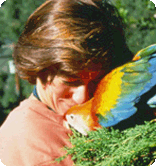Winter feeding of parakeets outdoors

My Question:
Winter feeding of parakeets in unheated outdoor aviary.
I live in East Anglia. This winter seems especially harsh. The parakeets have sheltered spots but no indoor housing. 2 ringnecks & one alexandrine hen sleep in nest boxes. The others roost outside concealed in fir tree branches.
I feed fresh fruit, birdy bread cooked with vegetables and parakeet seed mix with little sunflowers. I put up wild bird fat balls as well. The parakeets are eating far more seed than in summer. It was suggested that I add more sunflower seed to the mix in cold weather.
Category:
Parrot Care
Requestor Name:
Dot Schwarz

Hi Dot,
Thanks for the question. Your parakeets sound healthy and well-acclimated to life outdoors. However, I understand that a particularly harsh winter is cuase for concern.
Yes, I’d add more sunflower and safflower to a “winter mix” and also supplement with fresh corn on the cob, slightly cooked. Our psittacula relish corn. They’ll also eat other vegetables on cold mornings, especially when served warm—yams, squash and yellow potatoes.
As always, keep a close eye on them and encourage their exercise to maintain good health.
All best,
Phoebe Linden
Santa Barbara Bird Farm

































